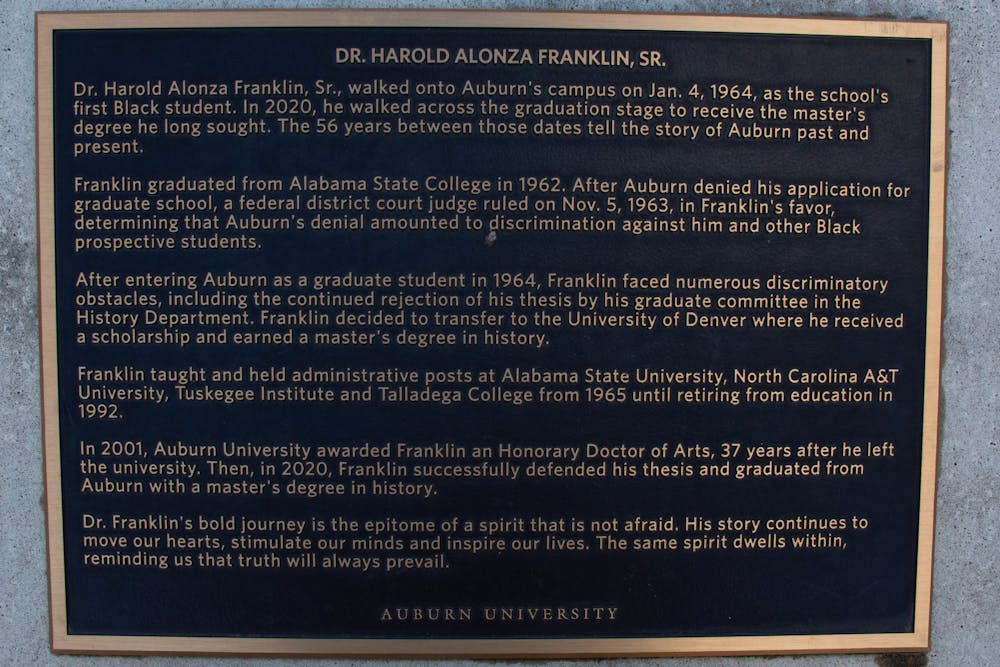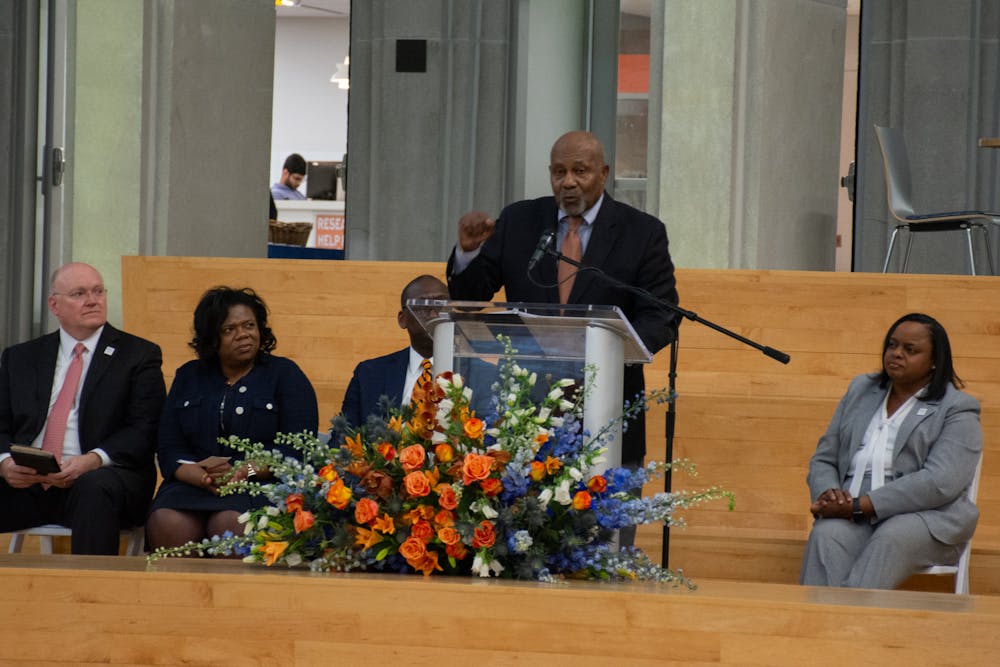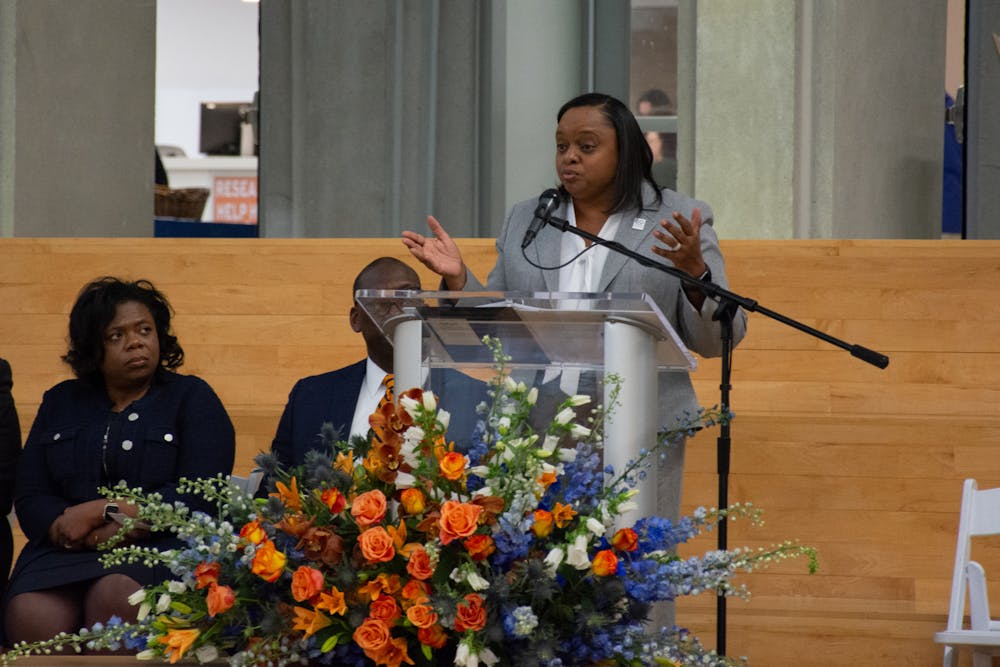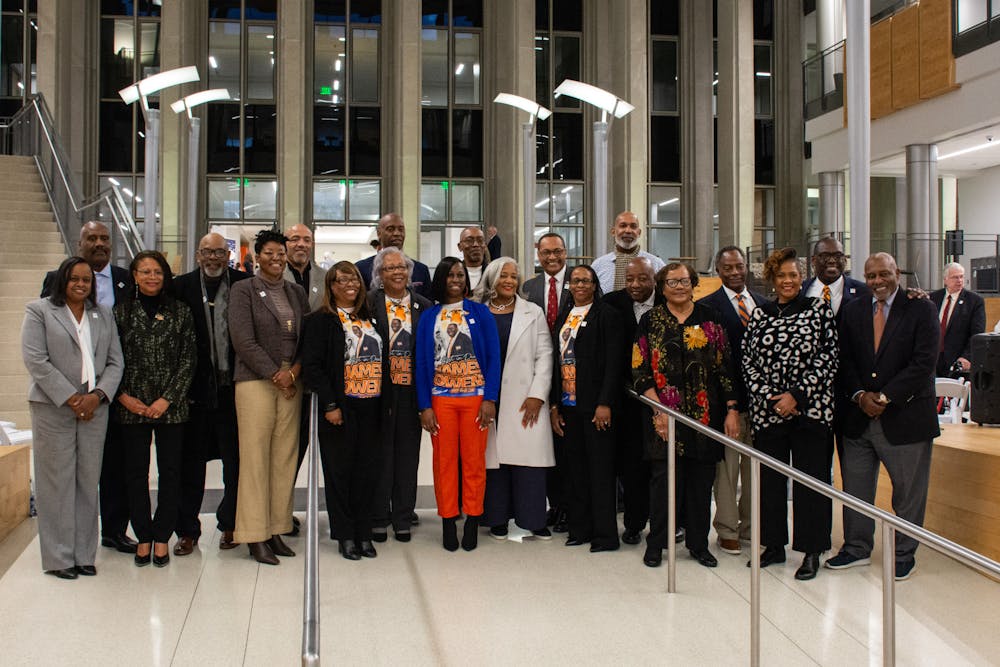During the month of January, Auburn University is celebrating 60 years of integration. January 4, 2024, marked the 60th anniversary of Harold A. Franklin's registration in graduate courses, paving the way for nonwhite students to attend Auburn.
Franklin enrolled as a graduate student in 1964 after suing the university for rejecting him on the basis of his race. Nine years earlier, the United States Supreme Court handed down its landmark ruling in Brown v. Board of Education, which declared racial segregation in public schools unconstitutional.
Alabama was integrated less than a year later. However, Alabama Gov. George Wallace stood at the doors of the University of Alabama to stop Black students from entering the institution. In response to this, President John F. Kennedy established Executive Order 11111, an order that federalized Alabama's National Guard and allowed Black students to register at white institutions.
Auburn University officials and FBI agents escorted Franklin to campus, yet they were stopped by state troopers sent by Wallace. Wallace also pressured Ralph Brown Draughon to announce that Magnolia Hall, the only men's dormitory at Auburn, wasn't hosting graduate students. Draughon declined to make this statement based on the 1963 lawsuit ruling.
When Franklin went to enroll, he was escorted under heavy guard, evocative of the 1960 New Orleans Four, a group of Black schoolchildren who faced harassment as they integrated their schools. Although he lived off campus, Franklin was isolated from his white peers.
Franklin was also denied by his advisor when he wanted to write a thesis on the American civil rights movement. Through sustained attempts, Franklin ended up writing his thesis on the history of Alabama State University.
Convinced he wouldn’t succeed at Auburn, Franklin withdrew in 1969 and transferred to the University of Denver. In 2001, Auburn awarded Franklin an honorary doctorate degree, and in early 2020, he returned to defend his thesis about Alabama State University. 56 years after transferring from Auburn in December 2020, Franklin received his master’s degree from Auburn. Franklin died on Sept. 9, 2021, in his home in Sylacauga, Alabama. Upon his passing, Auburn University honored him with a plaque outside of the Ralph Brown Draughon Library.

In memory of Franklin integrating the university, Auburn’s Office of Inclusion and Diversity held an event on Jan. 9, 2024. The ceremony brought together celebrated guests, a recollection of integration at Auburn and memories of Harold A. Franklin.
The ceremony opened with remarks from university President Christopher Roberts about the 60 years of integration at Auburn and how Franklin made a true change at the university. Roberts claimed he’s “proud of the steps this institution has made" in terms of diversifying Auburn.
He noted that none of this would be possible without Franklin, and he hopes current and future students hold the same attitude towards education Franklin did.
“Franklin provided a step in the right direction for future students, and it’s exciting to be here today to see alumni come together for this moment,” Roberts said. “Franklin never asked for anything but an opportunity.”
Roberts stressed the importance of diversity in Auburn and how it can be furthered in the future. He plans to allow students more access to resources regarding diversity, as well as increase support on campus for those who need it. Roberts mentioned it is important that faculty also “engage” more with nonwhite students.
The ceremony welcomed many honored guests, from sports alumni to relatives of influential alumni. President pro tempore of the Auburn University Board of Trustees Quentin Riggins, who acted as emcee for the ceremony, opened by acknowledging the celebrated guests. One of those guests was Thom Gossom Jr.
Gossom was the first Black athlete to graduate from Auburn. He claimed that he “had to be successful” when going to college because he was the first of his family to do so. Gossom recalled that his parents stressed the importance of education to him and wanted the best for their son.

“My dad grew up on a farm, and he never tried to hold me back. He always apologized to me because he couldn’t give me more,” Gossom said. “I was very blessed to have him in my corner — he taught me to be a man.”
Gossom fondly recalled his college years. In 1972, he became the first Black player on Auburn's football team, then under the leadership of Ralph "Shug" Jordan. Gossom was the oldest of his cousins and the first to attend an institution of Auburn’s size. He claimed that he “always knew he wanted to play football for Auburn” and made it his goal to get there.
“We never had a losing season; I was lucky to play with those guys. Coach Jordan was very strict and believed in discipline, but I know deep down inside he liked me, and deep down inside I respected him,” Gossom said. “The world was changing, and he wasn’t ready to change with it.”
During his speech, Gossom found himself becoming emotional recounting his time at Auburn. When finishing his story, Gossom left the crowd with one of his favorite quotes.
“‘It is wise to learn from the past and keep an eye on the future.’ I was proud to be the first,” Gossom said. “However, I couldn’t imagine being the only one like Harold Franklin, I couldn’t have done what he did.”
Elizabeth H. Huntley, a member of the board of trustees, spoke next, remembering Franklin as "quiet yet friendly" after she met at the fall 2020 commencement. Huntley made sure to be hospitable to Franklin, making sure he had everything he needed.

“The only thing he asked me for was to find the white man that talked to him no matter what. I can’t recall his name, but I knew they were friends,” Huntley said.
Huntley's search proved unsuccessful, with the board assuming Franklin's friend was dead. However, she managed to leave listeners with a life lesson as she closed her speech.
“Being the only one is like going somewhere and not being asked to dance. Franklin’s friend asked him to dance, and that’s all he wanted after all those years," Huntley said. "He saw the positive and wanted us to see the positive of his journey as well.”
Franklin’s resilience marked the path for many Auburn men and women to come. Alumni such as Thom Gossom Jr., Octavia Spencer, Lionel Richie and Willam Morganfield, among others, wouldn’t have attended the university otherwise.
Keeping Franklin’s legacy alive, his son Harold A. Franklin Jr. recalled his father being a “quiet man,” however, he remembered that when his father did speak, he spoke “volumes and proved it with actions.” He claimed that his father never boasted about his Auburn experience and that he just wanted an education.
Franklin Jr. thinks of his father as a “huge star,” always seeing the bright side of things in any situation. Franklin Jr. believes his father was influential not only to him but to others across Alabama.
“He always said to me, ‘if not me, then who,' even after not initially wanting to go to a publicly white institution,” Franklin Jr. said. “After his experience, he reminded me to always do my best, and if not, [then] there’s no more I could do.”
Do you like this story? The Plainsman doesn't accept money from tuition or student fees, and we don't charge a subscription fee. But you can donate to support The Plainsman.

Brychelle Brooks, senior majoring in public and professional writing with a minor in information systems, has been with The Auburn Plainsman since August 2023. She previously served as the Campus Reporter, Opinion Editor and Newsletter Editor. She is currently serving as the Editor-in-Chief.





